商务英语写作七原则
- 格式:doc
- 大小:48.00 KB
- 文档页数:9
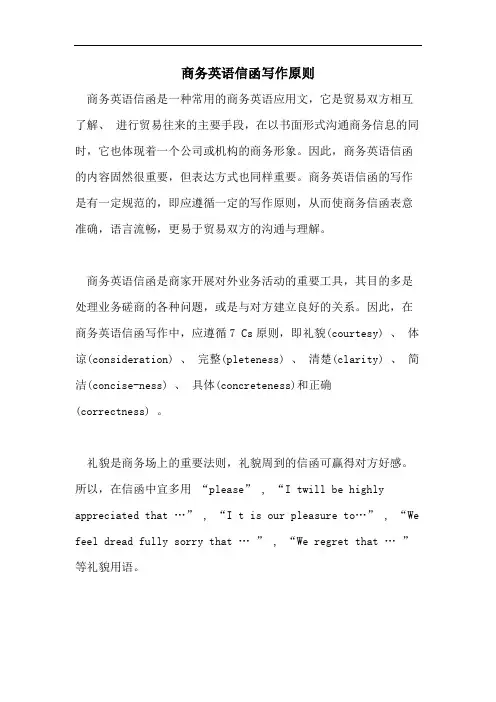
商务英语信函写作原则商务英语信函是一种常用的商务英语应用文,它是贸易双方相互了解、进行贸易往来的主要手段,在以书面形式沟通商务信息的同时,它也体现着一个公司或机构的商务形象。
因此,商务英语信函的内容固然很重要,但表达方式也同样重要。
商务英语信函的写作是有一定规范的,即应遵循一定的写作原则,从而使商务信函表意准确,语言流畅,更易于贸易双方的沟通与理解。
商务英语信函是商家开展对外业务活动的重要工具,其目的多是处理业务磋商的各种问题,或是与对方建立良好的关系。
因此,在商务英语信函写作中,应遵循7 Cs原则,即礼貌(courtesy) 、体谅(consideration) 、完整(pleteness) 、清楚(clarity) 、简洁(concise-ness) 、具体(concreteness)和正确(correctness) 。
礼貌是商务场上的重要法则,礼貌周到的信函可赢得对方好感。
所以,在信函中宜多用“please” , “I twill be highly appreciated that …” , “I t is our pleasure to…” , “We feel dread fully sorry that …” , “We regret that …”等礼貌用语。
业务往来难免有争端、摩擦,此时也需要礼貌来作为润滑剂,化解双方对峙的僵局。
信函中在索赔、抱怨、拒绝接受时,措词要力求客气、心平气和、语气委婉;在回复对方信函时,无论对方态度如何,在坚持自己立场的同时,都要有礼貌地作答。
首先,要善于使用被动语句,因为被动语态能使你的请求显得更加温和。
如“You made a very careless mistake.”若改成“Avery careless mistake was made.”会更好。
其次,要善于使用疑问句。
向对方提出要求时,陈述句、祈使句与疑问句相比,疑问句较其他两类句式更婉转、更礼貌。
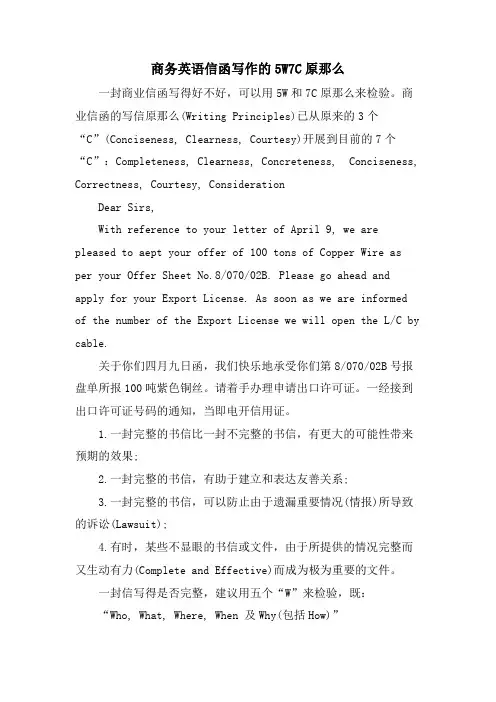
商务英语信函写作的5W7C原那么一封商业信函写得好不好,可以用5W和7C原那么来检验。
商业信函的写信原那么(Writing Principles)已从原来的3个“C”(Conciseness, Clearness, Courtesy)开展到目前的7个“C”:Completeness, Clearness, Concreteness, Conciseness, Correctness, Courtesy, ConsiderationDear Sirs,With reference to your letter of April 9, we are pleased to aept your offer of 100 tons of Copper Wire as per your Offer Sheet No.8/070/02B. Please go ahead and apply for your Export License. As soon as we are informed of the number of the Export License we will open the L/C by cable.关于你们四月九日函,我们快乐地承受你们第8/070/02B号报盘单所报100吨紫色铜丝。
请着手办理申请出口许可证。
一经接到出口许可证号码的通知,当即电开信用证。
1.一封完整的书信比一封不完整的书信,有更大的可能性带来预期的效果;2.一封完整的书信,有助于建立和表达友善关系;3.一封完整的书信,可以防止由于遗漏重要情况(情报)所导致的诉讼(Lawsuit);4.有时,某些不显眼的书信或文件,由于所提供的情况完整而又生动有力(Complete and Effective)而成为极为重要的文件。
一封信写得是否完整,建议用五个“W”来检验,既:“Who, What, Where, When 及Why(包括How)”例如在定货的信中,必须明确说明“需要什么商品”(What you want)“何时需要” (When you need the goods)“货物发到何地何人收”(to Whom and Where the goods to be sent)“如何付款”(How payment will be mande)如对对方的要求作出否认的答复时(如不能报盘,不能理赔等)应说明理由“为什么”(Why)。
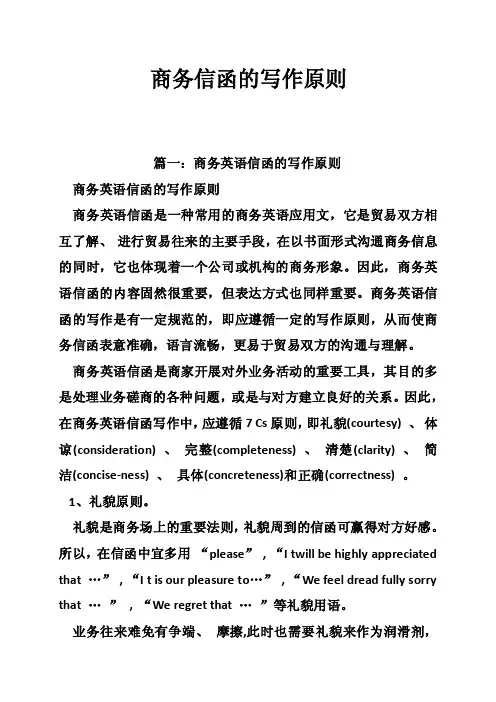
商务信函的写作原则篇一:商务英语信函的写作原则商务英语信函的写作原则商务英语信函是一种常用的商务英语应用文,它是贸易双方相互了解、进行贸易往来的主要手段,在以书面形式沟通商务信息的同时,它也体现着一个公司或机构的商务形象。
因此,商务英语信函的内容固然很重要,但表达方式也同样重要。
商务英语信函的写作是有一定规范的,即应遵循一定的写作原则,从而使商务信函表意准确,语言流畅,更易于贸易双方的沟通与理解。
商务英语信函是商家开展对外业务活动的重要工具,其目的多是处理业务磋商的各种问题,或是与对方建立良好的关系。
因此,在商务英语信函写作中,应遵循7 Cs原则,即礼貌(courtesy) 、体谅(consideration) 、完整(completeness) 、清楚(clarity) 、简洁(concise-ness) 、具体(concreteness)和正确(correctness) 。
1、礼貌原则。
礼貌是商务场上的重要法则,礼貌周到的信函可赢得对方好感。
所以,在信函中宜多用“please”, “I twill be highly appreciated that …”, “I t is our pleasure to…”, “We feel dread fully sorry that …”, “We regret that …”等礼貌用语。
业务往来难免有争端、摩擦,此时也需要礼貌来作为润滑剂,化解双方对峙的僵局。
信函中在索赔、抱怨、拒绝接受时,措词要力求客气、心平气和、语气委婉;在回复对方信函时,无论对方态度如何,在坚持自己立场的同时,都要有礼貌地作答。
首先,要善于使用被动语句,因为被动语态能使你的请求显得更加温和。
如“You made a very careless mistake.”若改成“Avery careless mistake was made.”会更好。
其次,要善于使用疑问句。
向对方提出要求时,陈述句、祈使句与疑问句相比,疑问句较其他两类句式更婉转、更礼貌。
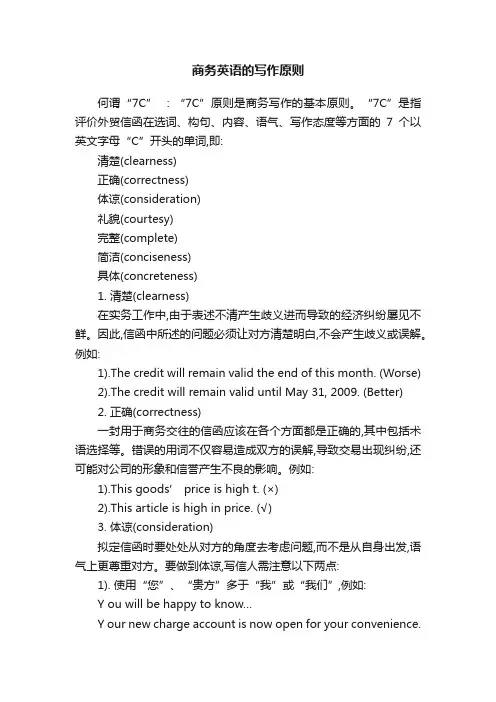
商务英语的写作原则何谓“7C” :“7C”原则是商务写作的基本原则。
“7C”是指评价外贸信函在选词、构句、内容、语气、写作态度等方面的7个以英文字母“C”开头的单词,即:清楚(clearness)正确(correctness)体谅(consideration)礼貌(courtesy)完整(complete)简洁(conciseness)具体(concreteness)1. 清楚(clearness)在实务工作中,由于表述不清产生歧义进而导致的经济纠纷屡见不鲜。
因此,信函中所述的问题必须让对方清楚明白,不会产生歧义或误解。
例如:1).The credit will remain valid the end of this month. (Worse)2).The credit will remain valid until May 31, 2009. (Better)2. 正确(correctness)一封用于商务交往的信函应该在各个方面都是正确的,其中包括术语选择等。
错误的用词不仅容易造成双方的误解,导致交易出现纠纷,还可能对公司的形象和信誉产生不良的影响。
例如:1).This goods’ price is high t. (×)2).This article is high in price. (√)3. 体谅(consideration)拟定信函时要处处从对方的角度去考虑问题,而不是从自身出发,语气上更尊重对方。
要做到体谅,写信人需注意以下两点:1). 使用“您”、“贵方”多于“我”或“我们”,例如:Y ou will be happy to know…Y our new charge account is now open for your convenience.2). 让对方时刻感受到你是站在对方立场上考虑问题的, 例如:We are now enclosing the latest pamphlet to you for your reference.Y ou earn 4% discount when you pay cash.4. 礼貌(courtesy)礼貌是外贸函电的重要特征。
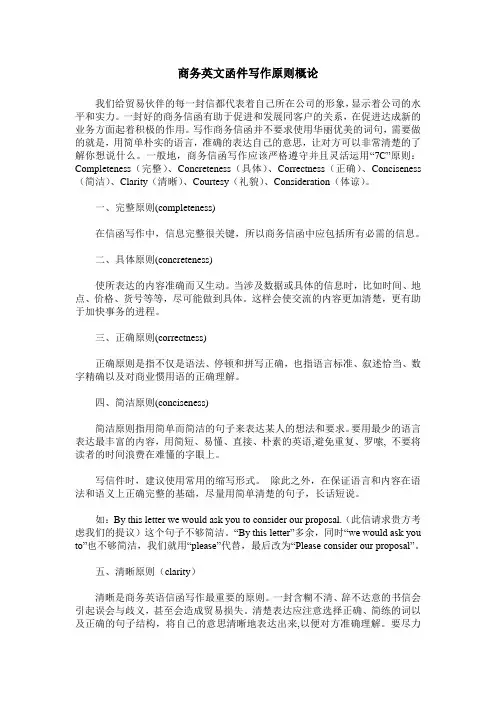
商务英文函件写作原则概论我们给贸易伙伴的每一封信都代表着自己所在公司的形象,显示着公司的水平和实力。
一封好的商务信函有助于促进和发展同客户的关系,在促进达成新的业务方面起着积极的作用。
写作商务信函并不要求使用华丽优美的词句,需要做的就是,用简单朴实的语言,准确的表达自己的意思,让对方可以非常清楚的了解你想说什么。
一般地,商务信函写作应该严格遵守并且灵活运用“7C”原则:Completeness(完整)、Concreteness(具体)、Correctness(正确)、Conciseness (简洁)、Clarity(清晰)、Courtesy(礼貌)、Consideration(体谅)。
一、完整原则(completeness)在信函写作中,信息完整很关键,所以商务信函中应包括所有必需的信息。
二、具体原则(concreteness)使所表达的内容准确而又生动。
当涉及数据或具体的信息时,比如时间、地点、价格、货号等等,尽可能做到具体。
这样会使交流的内容更加清楚,更有助于加快事务的进程。
三、正确原则(correctness)正确原则是指不仅是语法、停顿和拼写正确,也指语言标准、叙述恰当、数字精确以及对商业惯用语的正确理解。
四、简洁原则(conciseness)简洁原则指用简单而简洁的句子来表达某人的想法和要求。
要用最少的语言表达最丰富的内容,用简短、易懂、直接、朴素的英语,避免重复、罗嗦, 不要将读者的时间浪费在难懂的字眼上。
写信件时,建议使用常用的缩写形式。
除此之外,在保证语言和内容在语法和语义上正确完整的基础,尽量用简单清楚的句子,长话短说。
如:By this letter we would ask you to consider our proposal.(此信请求贵方考虑我们的提议)这个句子不够简洁。
“By this letter”多余,同时“we would ask you to”也不够简洁,我们就用“please”代替,最后改为“Please consider our proposal”。
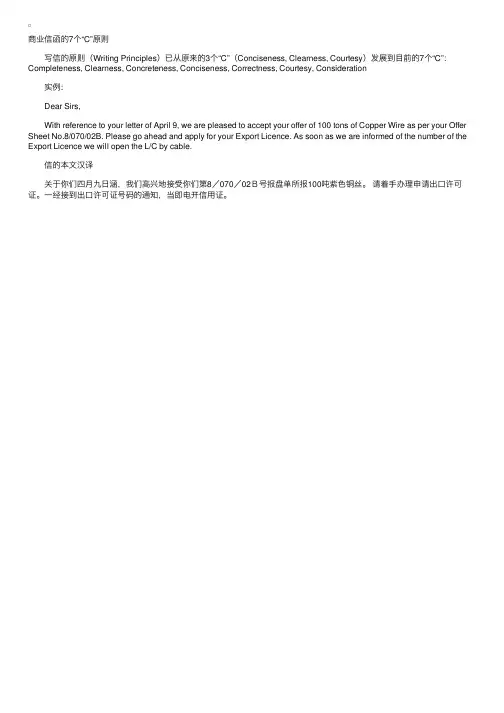

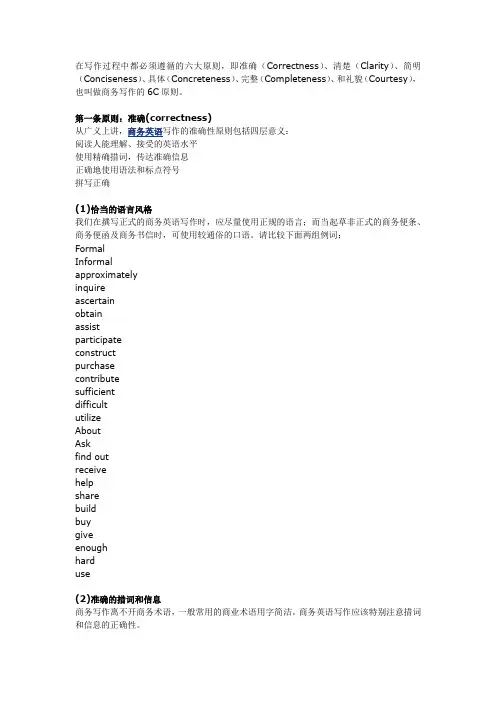
在写作过程中都必须遵循的六大原则,即准确(Correctness)、清楚(Clarity)、简明(Conciseness)、具体(Concreteness)、完整(Completeness)、和礼貌(Courtesy),也叫做商务写作的6C原则。
第一条原则:准确(correctness)从广义上讲,商务英语写作的准确性原则包括四层意义:阅读人能理解、接受的英语水平使用精确措词,传达准确信息正确地使用语法和标点符号拼写正确(1)恰当的语言风格我们在撰写正式的商务英语写作时,应尽量使用正规的语言;而当起草非正式的商务便条、商务便函及商务书信时,可使用较通俗的口语。
请比较下面两组例词:FormalInformalapproximatelyinquireascertainobtainassistparticipateconstructpurchasecontributesufficientdifficultutilizeAboutAskfind outreceivehelpsharebuildbuygiveenoughharduse(2)准确的措词和信息商务写作离不开商务术语,一般常用的商业术语用字简洁。
商务英语写作应该特别注意措词和信息的正确性。
(3)正确的语法和标点符号常见的标点符号错误主要出现在逗号、冒号、省字号等。
常见的语法错误一般出现在以下几个方面:①主谓之间的一致关系②代词与先行词之间的一致关系③悬垂句④修饰语与被修饰语之间的一致关系⑤状语的位置(4)正确的拼写第二条原则:清楚(Clarity)写作中要合理安排要点,运用正确的句型句法,突出重点,层次分明。
(1)逻辑布局(Logical Organization)常用的逻辑布局方法包括:①因果关系(Cause & Effect)②时间顺序(Chronological Development)③序列顺序(Sequential Development)④比较(Comparison)⑤一般到特殊(From General to Specific)⑥特殊到一般(From Specific to General)(2)合理构架句群与段落(Well-Written Sentences & Paragraphs)在商务英语写作中,应该合理安排句子和段落的结构与长度,把各种长句、短句、简句、复杂句等最佳组合成长度恰当的段落。
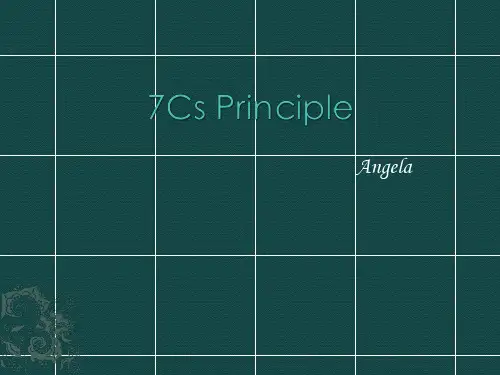
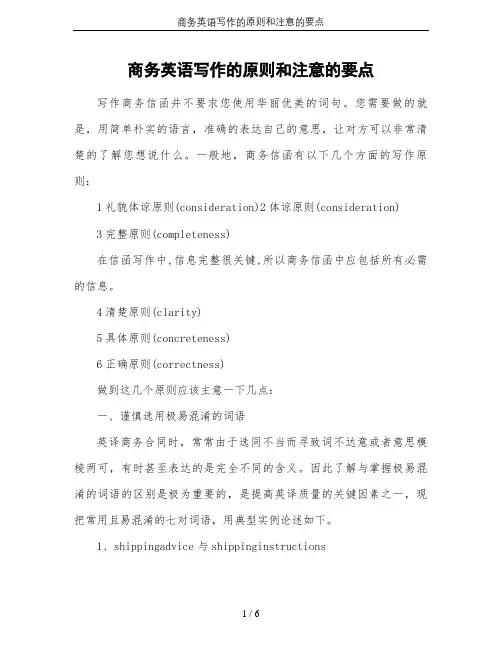
商务英语写作的原则和注意的要点写作商务信函并不要求您使用华丽优美的词句。
您需要做的就是,用简单朴实的语言,准确的表达自己的意思,让对方可以非常清楚的了解您想说什么。
一般地,商务信函有以下几个方面的写作原则:1礼貌体谅原则(consideration)2体谅原则(consideration)3完整原则(completeness)在信函写作中,信息完整很关键,所以商务信函中应包括所有必需的信息。
4清楚原则(clarity)5具体原则(concreteness)6正确原则(correctness)做到这几个原则应该主意一下几点:一、谨慎选用极易混淆的词语英译商务合同时,常常由于选同不当而寻致词不达意或者意思模棱两可,有时甚至表达的是完全不同的含义。
因此了解与掌握极易混淆的词语的区别是极为重要的,是提高英译质量的关键因素之一,现把常用且易混淆的七对词语,用典型实例论述如下。
1、shippingadvice与shippinginstructionsshippingadvice是“装运通知”,是由出口商(卖主)发给进口商(买主)的。
然而shippinginstructions则是“装运须知”,是进口商(买主)发给出口商(卖主)的。
另外要注意区分vendor(卖主)与vendee(买主),consignor(发货人)与consignee(收货人)。
上述这三对词语在英译时、极易发生笔误。
2、abideby与complywithabideby与complywith都有“遵守”的意思.但是当主语是“人”时,英译“遵守”须用abideby。
当主语是非人称时,则用complywith英译“遵守”。
双方都应遵守/双方的一切活动都应遵守合同规定。
BothpartiesShallabideby/Alltheactivitiesofbothpartiesshal lcomplywiththecontractualstipulations.3、changeAtoB与changeAintoB英译“把A改为B”用“changeAtoB”,英译“把A折合成/兑换成B”用“changeAintoB”,两者不可混淆。
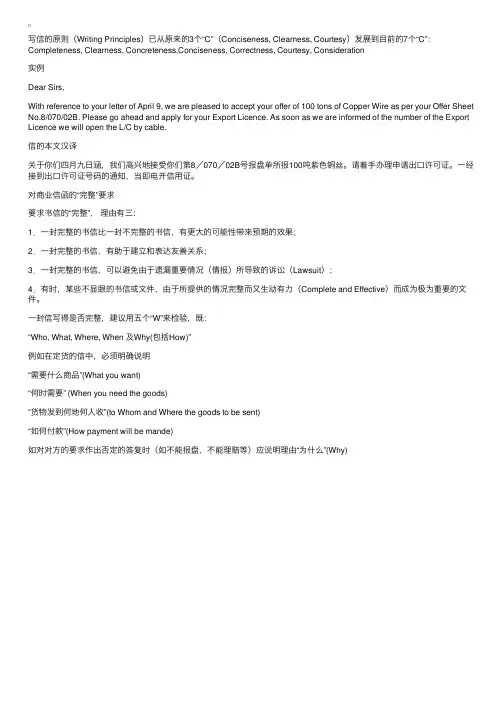
写信的原则(Writing Principles)已从原来的3个“C”(Conciseness, Clearness, Courtesy)发展到⽬前的7个“C”:Completeness, Clearness, Concreteness,Conciseness, Correctness, Courtesy, Consideration实例Dear Sirs,With reference to your letter of April 9, we are pleased to accept your offer of 100 tons of Copper Wire as per your Offer Sheet No.8/070/02B. Please go ahead and apply for your Export Licence. As soon as we are informed of the number of the Export Licence we will open the L/C by cable.信的本⽂汉译关于你们四⽉九⽇涵,我们⾼兴地接受你们第8/070/02B号报盘单所报100吨紫⾊铜丝。
请着⼿办理申请出⼝许可证。
⼀经接到出⼝许可证号码的通知,当即电开信⽤证。
对商业信函的“完整”要求要求书信的“完整”,理由有三:1.⼀封完整的书信⽐⼀封不完整的书信,有更⼤的可能性带来预期的效果;2.⼀封完整的书信,有助于建⽴和表达友善关系;3.⼀封完整的书信,可以避免由于遗漏重要情况(情报)所导致的诉讼(Lawsuit);4.有时,某些不显眼的书信或⽂件,由于所提供的情况完整⽽⼜⽣动有⼒(Complete and Effective)⽽成为极为重要的⽂件。
⼀封信写得是否完整,建议⽤五个“W”来检验,既:“Who, What, Where, When 及Why(包括How)”例如在定货的信中,必须明确说明“需要什么商品”(What you want)“何时需要” (When you need the goods)“货物发到何地何⼈收”(to Whom and Where the goods to be sent)“如何付款”(How payment will be mande)如对对⽅的要求作出否定的答复时(如不能报盘,不能理赔等)应说明理由“为什么”(Why)。
商务英语的原则
商务英语的原则是:
1. 清晰明确:商务英语要求表达清晰明确,避免使用模棱两可的词语或短语。
确保消息传达准确,不引起歧义。
2. 简练扼要:商务英语注重言简意赅,用尽量少的词语表达信息,避免冗长和啰嗦的表达方式。
3. 正式规范:商务英语应遵循正式规范的语法和词汇用法,不使用俚语、口语和地方用语,确保专业性和专注度。
4. 礼貌友好:商务英语中的交流应保持礼貌和友好的态度,使用适当的称谓和敬语,避免使用冒犯性或侮辱性的语言。
5. 多样化和灵活性:商务英语要适应不同的文化和背景,尊重不同的观点和习惯,同时也要具备灵活应对复杂情况的能力。
6. 实用性和专业性:商务英语应具备实用性和专业性,能够满足商务活动中的需求,包括写作邮件、报告和演讲等。
7. 确保准确性:商务英语要求准确地传达信息,避免语法错误、拼写错误和语义错误,确保信息的准确性和可靠性。
8. 适度的正式与非正式:商务英语需要根据不同的场合和对话对象适度的选择正式和非正式的语言风格,以增进沟通效果。
9. 注重商务礼仪:商务英语中需要注意商务礼仪和商务文化,包括称谓、礼节和礼品等方面的规范与应用。
10. 灵活运用技巧:商务英语需要灵活运用各种技巧,如语气的控制、鼓励性语言的运用和积极的沟通方式等,以增加自身的说服力和影响力。
商务英语写作的简洁礼貌原则及写作技巧随着经济全球化,国际商务的发展日益蓬勃,商务书信的沟通在各种商务情景中扮演着极其重要的角色。
“一封好的商务信函有助于促进和发展同客户的关系,在促进达成新的业务方面起着积极的作用”(2003丹尼尔·肯尼迪)。
因此,在写作时严格遵守并且灵活运用7“C”原则是必不可少的:Completeness(完整)、Concreteness(具体)、Cor—rectness(正确)、Conciseness(简洁)、Clearness(明晰)、Courtesy(YfU貌)和Conscientiousness(诚意)。
这七个原则是商务信函写作的最基本的指导原则,在这7“C”原则中,简洁、礼貌原则又是极其重要的两个原则。
本文主要研究这两个原则及探讨写作中所能运用的技巧。
二、简洁、礼貌原则及写作技巧(一)简洁原则及写作技巧商务信函的写作重点应始终放在“效率”二字上,要做到简洁。
简洁就是用最简单的话语准确地表达自己的意思,语言精练,言简意赅。
一般不需要礼节性的寒暄,最好是开门见山、直入主题,让对方很清楚地了解你想说什么,轻易地领会你的意图,从而快捷迅速地做出反应。
1.3W 的文章组织结构。
一封商务信函的全文结构可以用3W 来表示,即:Why do you writethe letter?(fg一部分);What’S the detailed rea—son?(第二部分);What do you expect your read—er to do?(第三部分)。
第一部分(Why do you write the letter?):在信函的一开头就要目的明确、简明扼要告诉读信者为什么要写这封信,如:W ill you please send me information aboutyour dress material# l 23,especially as to its fab—ric content?I am replying tO your letter of April15 asking US tO clear our M arch payment.这样的开头直接提出要求和询问,可以使得读信人立刻知道写信的意图,在读信的时候可以把注意力集中在问题的重点上。
7c原则在商务英语函电中的应用全文共10篇示例,供读者参考篇1Hey guys! Do you know what the 7C principle is in business English letters? Let me tell you all about it in a fun and easy way.First of all, the 7C principle stands for Clear, Concise, Correct, Complete, Concrete, Courteous, and Considerate. These are all super important when writing business letters.Clear means that your message should be easy to understand. Use simple language and avoid jargon or complicated words. You want to make sure your reader knows exactly what you're trying to say.Concise means keeping your message short and to the point. Don't ramble on or include unnecessary information. Get straight to the point and don't waste your reader's time.Correct means checking for any spelling or grammar mistakes. Make sure your letter is professional and error-free.Complete means including all the necessary information in your letter. Don't leave out any important details that your reader might need to know.Concrete means using specific examples or details to support your message. This makes your letter more convincing and helps your reader understand your point of view.Courteous means being polite and respectful in your language. Use please and thank you, and consider your reader's feelings.Considerate means thinking about your reader's perspective and addressing their needs or concerns. Show that you care about their feelings and opinions.So remember, when writing a business letter, always keep the 7C principle in mind. Your letters will be clear, concise, correct, complete, concrete, courteous, and considerate. And that's how you nail it in business English!篇27c Principle in Business English CorrespondenceHey guys! Today I want to talk to you about the 7c Principle in Business English correspondence. It's super important when you're writing emails or letters for work!1. Clarity: Make sure your message is super clear and easy to understand. Use simple language and avoid any jargon that might confuse the reader. Be direct and get straight to the point.2. Conciseness: Keep your message short and sweet. Don't ramble on and on. Get to the point quickly and only include the necessary information. Nobody wants to read a long, boring email.3. Correctness: Check your spelling and grammar before sending your message. You want to make a good impression, so don't let silly mistakes ruin it for you. Double check everything to make sure it's perfect.4. Concreteness: Be specific in your message. Use facts and figures to support your points. Avoid vague language that can be open to interpretation. Be clear and precise in what you're trying to say.5. Consideration: Think about the reader when writing your message. Consider their needs and preferences. Be polite and respectful in your tone. Show that you value their time and input.6. Completeness: Make sure your message includes all the necessary information. Don't leave anything out that the reader might need to know. Be thorough in your communication to avoid any confusion.7. Courtesy: Always end your message on a positive note. Thank the reader for their time and input. Use polite language and show appreciation for their attention.So there you have it, guys! Remember the 7c Principle next time you're writing a business email or letter. It will help you communicate more effectively and professionally. Thanks for listening!篇3The 7C principle is super important when we write business letters in English. It helps us to communicate clearly and effectively. Let's learn more about how we can apply the 7C principle in business English correspondence!1. Clarity: In our letters, we need to be clear and concise. Use simple and easy-to-understand language. Avoid technical jargon or complicated words that might confuse the reader.2. Correctness: Check your spelling and grammar before sending the letter. Make sure all the information is accurate and up-to-date. A mistake can make a bad impression on the recipient.3. Conciseness: Keep your letter short and to the point. Avoid unnecessary details and long sentences. Get straight to the main point and make your message easy to understand.4. Completeness: Make sure you include all the necessary information in your letter. Don't leave out important details or forget to address all the points you need to cover.5. Consideration: Think about the recipient's needs and perspective when writing your letter. Be polite and respectful in your tone. Show empathy and understanding towards their situation.6. Courtesy: Always use polite language and a friendly tone in your letters. Begin and end the letter with a polite greeting and closing. Thank the recipient for their time and consideration.7. Compliance: Follow the guidelines and standards of business communication. Use the appropriate format and style for the type of letter you are writing. Make sure you are following any legal or ethical requirements.By applying the 7C principle in your business English correspondence, you can ensure that your letters arewell-written, professional, and effective. So remember to always think about clarity, correctness, conciseness, completeness, consideration, courtesy, and compliance when writing your next business letter!篇4The 7Cs principle in business English letter writing is super important, just like following the rules in a game to win! Let's dive into how we can apply the 7Cs in our letters to make them super awesome!1. Clear: Make sure your letter is easy to understand, just like telling your friend a story. Use simple words and sentences so the reader knows exactly what you're talking about.2. Concise: Keep your letter short and to the point, like a quick chat with a friend. Don't ramble on and on, just say what you need to say and move on.3. Correct: Check and double-check your letter for any spelling or grammar mistakes, just like reviewing your homework before turning it in. You want to make sure everything is perfect!4. Complete: Make sure your letter has all the information the reader needs, like giving your friend all the details for a sleepover. Don't leave anything out or they might get confused.5. Courteous: Be polite and respectful in your letter, just like saying "please" and "thank you" to your teacher. It's important to show good manners in business letters.6. Considerate: Think about the reader's feelings and perspective when writing your letter, just like trying to see things from your friend's point of view. You want to make sure they understand and feel good about your message.7. Concrete: Use specific examples and details in your letter to make your points clear, like showing your friend a picture to help explain something. This will help the reader understand your message better.By following the 7Cs in your business English letters, you'll be sure to impress your readers and communicate effectively. Just remember to keep it clear, concise, correct, complete, courteous, considerate, and concrete! Happy writing!篇5The 7C principle is super important when you're writing business emails in English. It helps you make sure your emails are clear, concise, correct, complete, courteous, coherent, and concrete. Let's break down each C and see how it applies to business emails!1. Clear: When writing a business email, make sure your message is easy to understand. Use simple language and avoid jargon or technical terms that your reader might not know.2. Concise: Keep your emails short and to the point. Don't ramble on or include unnecessary information. Get straight to the point and be brief.3. Correct: Check your grammar, spelling, and punctuation before hitting send. Errors can make you look unprofessional and careless.4. Complete: Make sure your email includes all the information your reader needs. Don't leave out important details or neglect to answer all their questions.5. Courteous: Always be polite and respectful in your emails. Use phrases like "please" and "thank you" to show good manners.6. Coherent: Your email should have a logical flow and make sense to the reader. Use paragraphs to organize your thoughts and avoid jumping from topic to topic.7. Concrete: Provide specific examples or details to support your points. This helps to clarify your message and make it more convincing.By following the 7C principle, you can write effective and professional business emails that will impress your colleagues and clients. Remember to practice and always strive to improve your communication skills!篇6Hi guys! Today I'm gonna tell you about the 7C principle in business English letters. It's super important cuz it helps us write emails and letters in a clear and effective way.The first C is Clarity. This means that our letter should be easy to understand. We should use simple words and sentences to make sure the reader gets our message.The second C is Conciseness. This means we should keep our letter short and to the point. Nobody wants to read a long and boring email, right?The third C is Correctness. It's super important to check our grammar and spelling before sending out our letter. We wanna make a good impression, so we gotta make sure everything is perfect!The fourth C is Coherence. This means our letter should flow nicely from one point to the next. We should use transition words to connect our ideas and make sure everything makes sense.The fifth C is Completeness. We should make sure to include all the necessary information in our letter. We don't want the reader to be confused or have to ask for more details.The sixth C is Courtesy. We should always be polite and respectful in our letters. Saying please and thank you goes a long way!And finally, the seventh C is Consideration. We should think about the reader's perspective and tailor our letter to their needs. This shows that we care about them and value their time.So there you have it, guys! The 7C principle is super important in business English letters. Remember to keep it clear, concise, correct, coherent, complete, courteous, and considerate in all your correspondence. Happy writing!篇7Ahem, hello everyone! Today I'm going to tell you about the 7C principle in business English correspondence. It's super important in making sure our letters and emails are clear, concise, courteous, correct, coherent, complete, and credible.First off, clear means we need to make sure our message is easy to understand. We should use simple language and avoid jargon or fancy words that might confuse the reader.Concise means we should keep our message short and to the point. Nobody wants to read a long, rambling email that goes on and on. Get to the point quickly!Courtesy is all about being polite and respectful. Always start with a friendly greeting and end with a kind closing. Saying please and thank you also goes a long way.Correct means we need to check our spelling and grammar before sending anything out. Typos and mistakes can make us look unprofessional.Coherent means our ideas should flow logically from one to the next. We don't want to jump around or confuse the reader.Complete means we should include all the necessary information in our correspondence. Don't leave out anything important that the reader might need to know.Finally, credible means we need to be honest and trustworthy in our communication. Don't exaggerate or make false claims.So there you have it, the 7C principle in business English correspondence. Remember to keep your messages clear, concise, courteous, correct, coherent, complete, and credible. Happy writing, everyone!篇8Hey guys, do you know what the 7C principle is in business English? It's super important when writing business letters or emails. Let me break it down for you in a fun and easy way!The 7C principle includes: clarity, conciseness, coherence, completeness, correctness, courtesy, and consideration. Let's see how we can apply these principles in our business correspondence.First, let's talk about clarity. It means that your message should be clear and easy to understand. Use simple language and avoid jargon or complicated terms.Next, conciseness is all about keeping your message short and to the point. Don't ramble on and on, get straight to the point.Coherence means that your message should flow logically. Make sure your ideas are organized and make sense.Completeness is important because you need to provide all the necessary information in your correspondence. Don't leave anything out that the recipient might need to know.Correctness is a no-brainer. Check your spelling and grammar before sending any business correspondence. Mistakes can make you look unprofessional.Courtesy is about being polite and respectful in your communication. Always use appropriate greetings and sign-offs.Finally, consideration means taking into account the needs and feelings of the recipient. Tailor your message to their perspective and show empathy.So remember, when writing business letters or emails, keep the 7C principle in mind for effective communication. Happy writing!篇9Hi guys,Today I want to talk about the 7C principle in business English correspondence. It's super important to follow these rules when writing letters and emails in a professional setting. So let's dive in!The first C is clarity. It means you need to make sure your message is easy to understand. Don't use big words or complicated sentences. Be clear and concise.The second C is conciseness. This means being to-the-point and not rambling on. Keep your message short and focused on the main point.The third C is correctness. It's so important to check your spelling and grammar before sending any emails or letters. You want to make a good impression, and typos can make you look careless.The fourth C is coherence. This means that your message should flow logically and be easy to follow. Make sure you organize your thoughts in a clear and coherent way.The fifth C is courtesy. Always be polite and respectful in your correspondence. Say please and thank you, and use appropriate language for the situation.The sixth C is consideration. Think about the recipient's needs and perspective when writing your message. Make sure you provide all the necessary information and answer any questions they might have.And finally, the seventh C is completeness. Make sure your message is thorough and includes all the information the recipient needs. Don't leave anything out or make the reader guess what you're trying to say.So remember, when writing business English correspondence, follow the 7C principle: clarity, conciseness, correctness, coherence, courtesy, consideration, and completeness. This will help you communicate effectively and professionally in any business setting.That's all for now! Thanks for listening.Bye!篇10Title: Using the 7C Principle in Business English CorrespondenceHey guys, have you heard about the 7C principle in business English correspondence? It's super important when writing emails or letters in a professional setting. Let me break it down for you in a simple way:1. Clarity: Make sure your message is clear and easy to understand. Use simple language and avoid jargon or complicated phrases.2. Conciseness: Keep your message short and to the point. Don't ramble on or include unnecessary information. Get straight to the point.3. Correctness: Check your spelling and grammar before sending out your email or letter. Mistakes can make you look unprofessional.4. Coherence: Make sure your message flows logically and is easy to follow. Use transitions and organize your ideas in a coherent manner.5. Consistency: Use a consistent tone and style throughout your correspondence. This helps to establish your professionalism.6. Courtesy: Be polite and respectful in your communication. Use formal language and always thank the recipient for their time.7. Completeness: Make sure you include all necessary information in your message. Don't leave out important details that the recipient needs to know.So, remember to follow the 7C principle next time you're writing a business email or letter. It will help you communicate effectively and professionally in a business setting. Good luck!。
商务英语函电的七C’s原则及其语言特点作者:王树清来源:《商场现代化》2008年第36期七C’s原则指的是:Completeness ,Conciseness, Consideration, Concreteness, Clarity, Courtesy, Correctness一、Completeness (完整)一封商业信函应概括各项必需的事项,要写清楚所有所需信息和反馈的信息。
Firstly, complete messages are more likely to bring the desired results without the expense of additional messages .Secondly, they can do a better job of building goodwill. Thirdly, complete messages can help avert costly lawsuits which may result if important information is missing. Finally, papers that seem inconsequential can be surprisingly important if the information they contains is complete and effectively.二、Conciseness (简洁)简洁明了的语言是现代商务英语的突出特点1.首字母缩略语例如:L/C (letter of credit)信用证,B/L(Bill of Lading)海运提单,POD(port of destination)目地港。
2.截短词例如:biz (=business)商业,Corp (=corporation)公司等。
3.避免废话连篇例(1)We wish to acknowledge receipt of your letter...可改为:We appreciate your letter...(2)Enclosed herewith please find two copies of...可改为: We enclose two copies of...4.短句、单词的运用(1)Enclosed herewith——>enclosed(2)at this time——>now三、Consideration (体谅)书写商务英语信函时要处处从对方的角度去考虑有什么需求,要尊重对方。
商务英语作文12个写作原则In the realm of business, effective communication is paramount, and this is especially true when it comes to writing. Here are twelve principles to consider when crafting business English compositions:1. Clarity: Ensure that your message is clear and straightforward. Avoid ambiguity to prevent misunderstandings.2. Conciseness: Keep your writing brief and to the point. Long-winded sentences can confuse readers and detract fromyour message.3. Coherence: Maintain a logical flow in your writing. Each paragraph should connect smoothly to the next, guidingthe reader through your argument or information.4. Correctness: Use correct grammar, spelling, and punctuation. Errors can undermine your credibility anddistract from your message.5. Conciseness in Vocabulary: Choose words that areprecise and carry the most meaning with the fewest syllables.6. Consistency: Maintain a consistent tone and style throughout your writing. This helps to establish aprofessional and unified voice.7. Objectivity: Present information objectively, avoiding personal bias or emotional language that can influence the reader's perception.8. Relevance: Stay focused on the topic and avoidincluding irrelevant information that may dilute your message.9. Professionalism: Use a professional tone that is appropriate for the audience and the context of the communication.10. Adaptability: Tailor your writing to suit the needsof your audience, considering factors such as their level of expertise and their interests.11. Actionability: Where appropriate, include clear calls to action that guide the reader on what steps to take next.12. Proofreading: Always proofread your work to catch and correct any errors before sending it to your audience.By adhering to these principles, your business English writing will not only be more effective but also leave a positive impression on your readers.。
Chapter 2 7Cs Principle: Completeness and Conciseness 7Cs PPrriinncciippllee 11:: CCoommpplleetteenneesss s 7Cs Principle 2 : Conciseness
Completeness Conciseness Consideration Correctness Clarity Courtesy Concreteness
1. 7Cs Principle1: Completeness Keep in mind the following guidelines to write completely 1) Try to answer all questions asked. Whenever you reply to a letter containing one or more questions, try to answer all of them--stated or implied. If you have no information on a precise question at the moment, just say so clearly and sincerely, instead of leaving out the answer.If you have unfavorable news in answer to one or more questions, handle your reply with both tact and honestly. When saying no, be courteous and polite, but firm. Eg.1 We can not deliver the goods until May 1. (poor) We can deliver the goods on May 1. Eg.2 We regret to inform you that we deny your request for credit. For the time being we can only serve you on a cash basis.
Dear sirs: Many thanks for your order of October 12. After careful consideration, we have come to the conclusion that it would be better for you to approach another manufacturer for the products you desire. To produce the machine required according to your specifications would mean setting up special equipment at our factory. This would not only be impossible to accomplish before the end of this year, but would seriously interrupt our production schedule. We are sorry not to be more helpful, but hope that you will understand our position. Please contact us again. We will be pleased to serve you in the future. Yours sincerely, 2) Volunteer sth. Extra which, you think, may be of some use to your reader now or in the future. Eg. Do you think it is enough to tell just the prices of the bicycles in the reply? We are one of the most important importers of bicycles in Lagos, Nigeria, and would like to extend our business relations to you. Would you please let us know the prices of your first-rate bicycles available for export to this country? 3) Check for the 5W2H and any other essentials. 5W2H: Who, What, Where, When, Why, How, How much eg. In a letter of ordering goods, we must tell clearly: What(What we want) When(When we need the goods) Whom and Where(to Whom and Where the goods to be sent) How(How payment will be made? How we would like them to be packed and shipped) How much(How much goods do we need) For some letters---especially those that bring bad news, answering the question “why” is of vital importance. A message that answers the question why is more likely to motivate the correspondent to take the desired action than the one that does not explain why.
2. 7Cs Principle 2 : Conciseness Conciseness ------communicating an idea in the fewest words without sacrificing completeness and courtesy. Guidelines to write concisely
1) Omit trite expression eg. Not This But This Please don’t hesitate to write to us Please write us due to the fact that because during the year of 2003 during 2003 in the city of London London in due course soon for the reason that since; because in the event that if this is to advise you 5 wasted words from the point of view of as for a price of $200,000 for $200,000 in accordance with your request as you requested; as requested
2) Avoid wordy statements and unnecessary repetition. Eg.1 I am writing you at this time to enclose in this letter a tentative plan for the forthcoming visit to California by our Director Mr. Nei next August when we might get together to discuss matters of mutual interest. (39) Here is a tentative plan for Mr. Nei’s visit to California next August. (13)
eg.2 We hereby wish to let you know that we fully appreciate the confidence you have reposed in our products. (19) We appreciate your confidence in our products. (7)
3) Remove all the irrelevant facts in your message. Major causes of irrelevancy mainly includes: Not coming to the point. Including information obvious to the reader. Using big words to make an impression. Being excessive polite. Making too many unnecessary explanation Not revising the first draft of a long, complicated message eg. We would like to know whether you would allow us to extend the time of shipment for twenty days, and if you would be so kind as to allow us to do so, kindly give us your reply by cable without delay. (better)Please reply by cable immediately if you will allow us to delay the shipment untiL April 21.